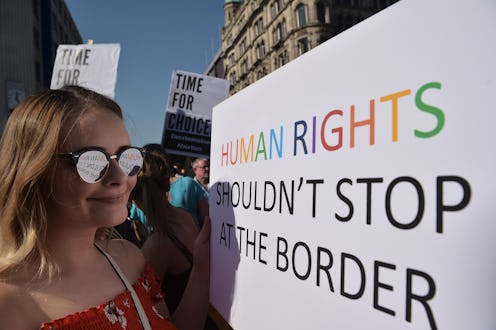News
Northern Ireland Is The Next Abortion Rights Frontier After Historic "Repeal The 8th" Vote

The landslide majority in favor of abortion rights in Ireland last week will not bring change to the entire island. Northern Ireland is actually a part of the United Kingdom and has its own reproductive health law, so activists have called on Prime Minister Theresa May to bring Northern Ireland's abortion legislation in line with the rest. But so far, May has refused, arguing it should be decided locally.
That was unacceptable to the hundreds of women and supporters who rallied in Belfast on Monday and raised the call, "The North Is Next" and "Trust Women." Many singled out May's key role in bringing change to the UK region. The crowd chanted, "Our bodies, our lives, our right to decide" and, "One, two, three, four, we won’t be silenced anymore. Five, six, seven, eight, it’s time for May to legislate.”
"The North is Next" speaks to the results of the Repeal the Eight referendum held in the Republic of Ireland. The vote resulted in 66 percent in favor of loosening abortion restrictions and just 33 percent in favor of keeping it outlawed in the Irish Constitution. No main political party there opposed the repeal. Legal abortion for any reason up to the 12th week of pregnancy is expected to be introduced soon to the Oireachtas, or parliament, and should pass by the end of the year.
This change will make the difference in the North's laws even more apparent. Abortion is currently outlawed there except when the mother's life is in danger. This has caused many to travel to Britain for the procedure, or to order illegal abortion pills online, just like has happened for decades in the Republic of Ireland.
One of the activists in attendance at Belfast's rally was Leah Rea, who also holds the role of international secretary in one of Northern Ireland's political parties, the Social Democratic and Labour Party or SDLP. She said that the current criminal law around abortion is "archaic" and that it must go. She tells Bustle, "It is unclear for medical professionals, it is detrimental to women and their health, it discriminates against low income women, it violates their dignity and rights, and criminalizes vulnerable women who deserve compassion and support, not a criminal record."
Many of the campaigners in the North called the law a "Victorian-era abortion ban." Grainne Teggart, the Northern Ireland campaigns manager for Amnesty International said in a statement:
It’s hypocritical, degrading and insulting to Northern Irish women that we are forced to travel for vital healthcare services but cannot access them at home. The UK Government can no longer turn a blind eye and deny us equality. We cannot be left behind in a corner of the UK and on the island of Ireland as second-class citizens.
That does not mean that the people of Northern Ireland are behind the times, Rea tells Bustle. "It could be easy to dismiss the general population of the North as being outdated or 'behind' their compatriots in the South, but evidence suggests this is not the case," Rea says, quoting a 2016 survey that shows a majority of support for legal abortion in certain cases like rape, incest, and serious fetal abnormalities.
"There has always been a strong activist presence for reform of the law, and I feel the result in the referendum will encourage this movement further," Rea says.
Arlene Foster, the head of the Democratic Unionist Party (a conservative party that opposes extending abortion rights), said in a statement Monday that the Republic of Ireland's vote has no influence on the North and that it must be decided locally, not by the full UK parliament. Northern Ireland has its own assembly, but a disagreement has kept it from meeting since January 2017. That has held up votes on many important issues, including other social issues like marriage equality.
"Friday's referendum has no impact upon the law in Northern Ireland, but we obviously take note of issues impacting upon our nearest neighbour," Foster said. "The legislation governing abortion is a devolved matter and it is for the Northern Ireland Assembly to debate and decide such issues."
Coupled with a congratulations to the women of the Republic on Twitter, that is the stance May has also taken. Her opposition to legislating in the North comes much to the dismay of others inside her own government, including May's women and equalities minister, Penny Mordaunt. Mordaunt and her four predecessors told May to allow a free vote in the UK parliament to change the law, The Times reported.
Mordaunt wrote on Twitter, “A historic and great day for Ireland and a hopeful one for Northern Ireland. That hope must be met." May's decision may prove both a litmus test on her leadership and her feminist claims.
That frustration is echoed by activists in Belfast like Rea. "[May] cannot welcome the decision made by the majority of the electorate in the Republic, whilst closing her eyes to a similarly restrictive law within the UK. She should show leadership, and act — and uphold human rights and dignity," Rea says. "She cannot call herself the Prime Minister of Great Britain and Northern Ireland, and not understand the issues in the North."